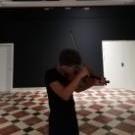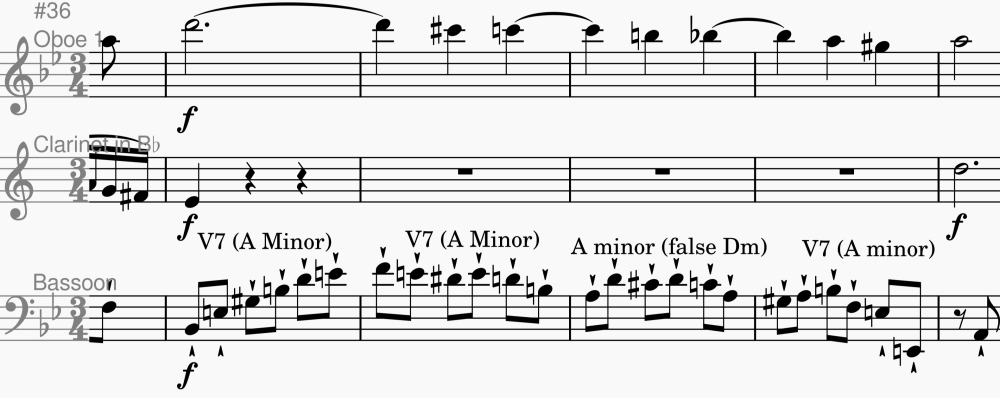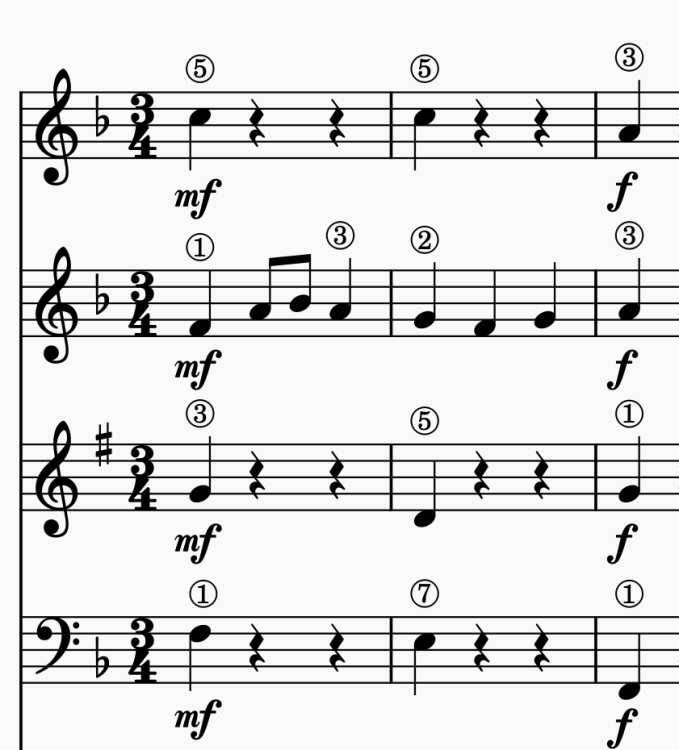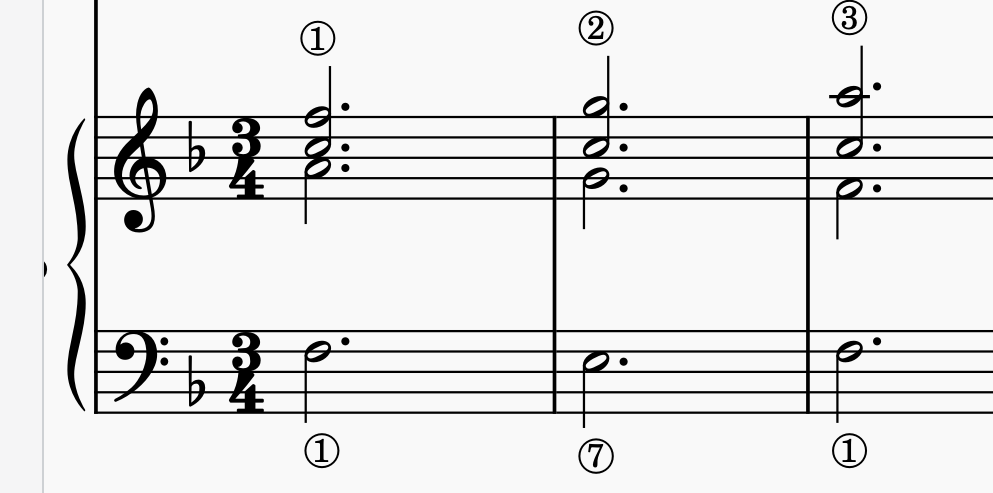-
Posts
291 -
Joined
-
Last visited
-
Days Won
14
Markus Boyd last won the day on March 28 2025
Markus Boyd had the most liked content!
About Markus Boyd

- Birthday 08/23/1995
Profile Information
-
Biography
Markus Boyd from the Isle of Man. Composing since I was 14 years old, playing guitar since I was 8.
-
Gender
Male
-
Location
Isle of Man
-
Occupation
Student
-
Interests
Baroque, classical and early romatic music.
-
Favorite Composers
Johann Christian Bach; JS Bach; Mozart; Vanhal; Zalenka; Handel; Hasse
-
My Compositional Styles
Neo-classical, neo-baroque
-
Notation Software/Sequencers
Musescore 4
-
Instruments Played
Classical Guitar; Piano
Recent Profile Visitors
3,527 profile views
Markus Boyd's Achievements
-
Thought I would share this as an ongoing project. I will be jumping into the development section soon. This is my first serious work for full scale orchestra. As many will know from my other work I tend to focus on chamber music. I hope it is engaging (I have been experimenting a little how I can keep the listener on edge with sudden, unexpected harmonic shifts and contrasting dynamics).
- 1 reply
-
- 1
-

-
Many thanks for your input! I feel your enthusiasm for these types of posts. They are, after all, a kind of public challenge for which we can showcase our knowledge while also collaborating with others. I would personally like to get more involved with such things. It would be awesome if we maintained, as a group, a repository for knowledge in the art of composition - for example how to consider voice leading against chromaticism. No doubt we would need distinct zones for functional harmony and otherwise to accommodate people's diverse ascetic interests on this forum. That aside, I had seen E as a common tone opportunity for a pedal, potentially, but that seemed a little boring and unadventurous. However, as you suggest, perhaps it is neither necessary to add further complexity if the outer voices are already doing something interesting and distinct. Nonetheless, I thought I would rise to the challenge. I like your solution - that largely moves in thirds with the base and for which there are opportunities for further refinement by recycling some motifs from elsewhere in the piece. I am unsure about the treatment of the third bar as E7, considering the bass resolves to A minor, although the only note that may undermine this is the D in the clarinet during the third beat of that bar. You're right about the b natural in the bassoon - that was an oversight on my part. I will have a tinker over the coming days and report back here with what I've come up with.
-
I have been working on a woodwind trio for which I have written a passage which has been confusing at best. As I tend to be guided by my ear when writing, I sometimes write things that sound aligned with my expectations but which I do not entirely understand! This seems to be amplified when I use chromaticism, as in this example. I think I now understand, but I am a bit stuck on what to write in the inner voice. My understanding is that the first two bars mark the dominant of A minor, with a D sharp chromatic inflection in the bass in the second but which resolves in the third beat. And the third bar is I in A minor, with a C sharp chromatic inflection implying d minor but resolving to an A minor chord. This proceeds to the V7 of A minor in preparation for the cadence in Am (but in fact resolves to F major). The upper voice descends chromatically in such a way that complicates the harmony and opportunities to fill in the middle voice. My low experience with chromaticism really shows its true colors here. I have attached the audio - the passage in question is from the 50 second mark. Would be great to hear other's perspectives.
-

Adagio (introduction) for a larger scale work
Markus Boyd replied to Markus Boyd's topic in Chamber Music
Finally managed to get some time to finish this piece. Uploaded below should anyone wish to listen. Hope everyone is well. -
I first encountered this work by Pärt as a teenager through a music teacher. The purist in me for tonal & well balanced music would usually have me running for the hills from this thing; yet I am captivated by it for the mad comedy Pärt produces here. I consider it a kind of trolling of epic proportions and he no doubt had much fun writing it. It is also fascinating to read the score alongside the music to see how the sheer chaos is actually written. At face value it seems much of the chaos is somewhat improvised with a little guidance. It is definitely art; but this kind of art doesn't usually undergo repeat performances!
- 1 reply
-
- 1
-

-

Adagio (introduction) for a larger scale work
Markus Boyd replied to Markus Boyd's topic in Chamber Music
Thank you for pointing that out. This should be g major chord followed by d major (in effect transitioning from C minor to G minor). My placement of the A natural in the flute is what sounds funny. Because it clashes with both the G natural and B natural. I had reasoned this as a necessary dissonance (maintaining consistent intervalic movement in upper parts) that resolves on d major. This also gives primacy to the d major chord in that bar (A, F#). However now that you have pointed out I think there is a better solution. I’ll have to have a look later. 🙂 -
My advice would be to write music as if it were not just a conversation but a debate and, at times, and argument! A convincing narrative that can capture the listener will flow between states of tension, release and fundamental questions. You might wonder how this will help with the technical side of achieving this. And you’re right, it’s not easy. It takes me a lot of time. However, I don’t personally begin the process on a technical level. I just let the ideas flow and worry about the embellishments later. And you can work that out one way or another with determination. I hope that helps.
-
I was trying to imply that the larger scale a work the more intensive the constructive feedback process becomes. There is just so much to look at here. For what it’s worth, I felt that the minor mode could have been balanced a little more with the major mode in the first movement for better contrast. I listened to the movement again and there are only isolated and short lived instances of modulation to a major key. Not all music needs to be happy, of course… but there should be some form of hope that the listener is bound to. And that comes a little late with the second movement. Gorecki’s symphony of sorrow comes to mind… or Mozart’s great mass in c minor , in which the soprano in the opening movement features provides immediate relief from the otherwise ‘dire’ mood. That is all I can really constructively say without looking at the music in great detail. 🙂
-

Symphony No. 2 in F# Minor
Markus Boyd replied to Rômulo Mello's topic in Orchestral and Large Ensemble
Solid work. Although I think you can work with better soundsets! -
Very impressive, @Aiwendil. This is an accomplished work.
-
Wow, @Rich. This is an immense work. It is difficult to provide constructive feedback on something with such depth. I would, though, like to hear more about your influences for this work. Who are your role models and the style you are emulating? It sounds to me like something from the middle-late romantic period and, admittedly, that is not my niche! The engraving is also impressive.
-

Trio Sonata in g minor for Alto Recorder, Violin and Continuo
Markus Boyd replied to Willibald's topic in Chamber Music
I listened to the whole thing. It is always impressive to see other composers undertaking the task of writing in baroque revival - and you even use figured bass! I generally enjoyed your work, although building on @muchen_'s comment about variety I agree this is needed. I would also suggest using better sound sets to aid the listening experience. The latest musescore offers excellent sounds for free so there shouldn't be an excuse to not make use of that software package. I look forward to hearing more of your work. -
I promised I would have a little look at your piece in detail. So here goes... I didn't wish to interfere with your melodic writing so have focused on providing input regarding voice leading principles. Let's look at the opening motif... (The numbers I have entered above the notes below indicate their scale degree and this useful for voice leading analysis). A) In this opening, the bass features scale degrees 1-7-1. This pattern is typically used to accommodated a higher voice ascending from 1-2-3 respectively, while other voices may descend from 3-2-1 or maintain a pedal on scale degree 5. The melodic line in this example (oboe) emphasizes scale degrees 3-2-3, which is a non-standard solution on the basis that this would lead to consecutive with 3-2-1 part as well as a possible ascending (1-2-3) line. It would make more sense to close the melodic line on scale 1 (F natural) to to accommodate the contrary motion that makes this opening gambit effective. Notice that the voice leading for your clarinet line is not smooth as a result of this configuration. In these situations, it is desirable to facilitate stepwise motion between the individual parts opposed to leaping about; if you are leaping around excessively, it suggests the voice leading could be improved. Finally, the bass returning to F in bar 3 doesn't need to drop to the lower octave, and the flute part can remain on scale degree 5 due to the doubling of the third being unnecessary. Here is how the voice leading could be realized, which as you can see consists of oblique, contrary and parallel motion with no consecutive 5ths/8ves B) The other example I want to use is the nice melodic line from bar 11. It is quite beautiful. However, the other parts are a bit muddled. Let's isolate this part with the bass alone to see what's going on... In several places the bass part clashes with the melodic line, especially at the end cadence. There are also consecutive octaves in one or two places. I have realized an alternative bass for you to have a look at and compare. Note that I look for opportunities for contrary motion wherever possible, while retaining the strength of the chord that is being realized (for example, avoiding doubling the outer voices). It is good practice to avoid doubling the bass and main melodic line in the interest of maintaining independence. You can double with inner, supportive parts more freely. I have provided an audio of our respective realizations... Here is my realization If I evaluated all aspects of your piece in this manner I'd spend a whole day doing so! So I will stop here. But I hope you can appreciate the importance of effective voice leading in your work. Always consider the outer voices in first instance to arrive at a coherent skeleton that can then be embellished by filling out the inner or supportive elements. If you have not yet read Robert Gjerdigen's 'Music in the Galant Style', I would recommend doing so for further voice leading instruction and especially if you like the galant style. This wikipedia page can provide an introduction to the analytical system that he advocates using (schema theory): https://en.wikipedia.org/wiki/Galant_Schemata Feel free to ask any questions.
-
Thought I'd share this work in progress for any thoughts (ideally on the opening adagio). I have only made some rough ideas for the subsequent Presto. I am still experimenting a little with more harmonic progressions... I personally like it, but please be honest if you think it works or not. I took inspiration form Haydn's symphony no 102 for the final shift from F minor to Fm7 in the introduction.
-
makes sense… I always struggle to add an anacrusis in musescore… its unnecessarily complicated! By independence I mean doing something more interesting than simply providing harmonic support. There are moments when you do have some contrary motion but this could be more refined. When I write for wind instruments, I like to think of each instrument as individual characters in a story that each not only have something unique to say, but also something interesting to say to each other. In a sense, good writing should evoke an intriguing story and which induces an array of relatable emotion. This is also why it it’s important to modulate to, because remaining in a single key will limit your means to convey that to your audience. Wind instruments are great for storytelling for the unique characterful sound of each instrument. One other point is that some of your motifs evoke several galant schema but which just need some tweaking to the voice leading to make it more compelling. It suggests you listen widely to galant music and know what patterns you’d like to apply, but just needs some guidance to refine. I will show you exactly what I mean when I have some more time on my hands next week.




.thumb.png.8b5b433a341551e913a34392660bc95b.png)













